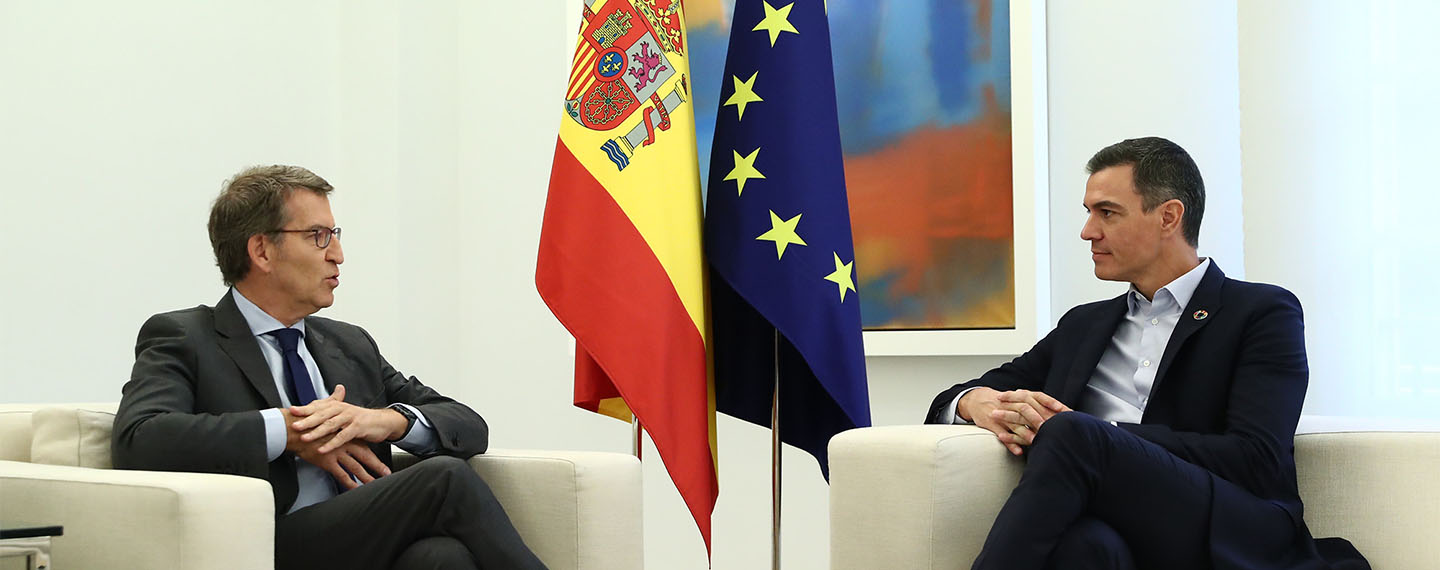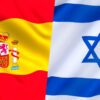Two months after July’s snap and inconclusive general election, there are no signs of a new government. The Popular Party (PP), which won the most seats in parliament (137 out of 350), will have the first stab on 27 September when an absolute majority is required at the first investiture vote and a simple majority at the second on the 29th. The support of the hard-right VOX (33 MPs) and two small parties gives the PP 172 votes, which is not enough to get it over the line (176) unless it has other backing or, in the second vote, abstentions, both of which are highly unlikely, barring last minute surprises (see Figure 1).
Figure 1. Results of general elections, July 2023 and November 2019 (seats, millions of votes and % of total votes)
| July 2023 | November 2019 | |||||
| Seats | Votes | % | Seats | Votes | % | |
| Popular Party | 137 | 8.0 | 33.1 | 89 | 5.0 | 20.8 |
| Socialists | 121 | 7.7 | 31.7 | 120 | 6.8 | 28.0 |
| VOX | 33 | 3.0 | 12.4 | 52 | 3.6 | 15.1 |
| Sumar | 31 | 3.0 | 12.3 | – | – | – |
| Catalan Republican Left | 7 | 0.4 | 1.9 | 13 | 0.9 | 3.6 |
| Together for Catalonia | 7 | 0.4 | 1.6 | 8 | 0.5 | 2.2 |
| EH Bildu | 6 | 0.3 | 1.4 | 5 | 0.3 | 1.1 |
| Basque Nationalist Party | 5 | 0.3 | 1.1 | 6 | 0.4 | 1.6 |
| Other parties | 3 | 0.3 | 1.3 | 5 | 0.3 | 0.9 |
| Ciudadanos | – | – | – | 10 | 1.6 | 6.8 |
| Unidas Podemos | – | – | – | 35 | 3.1 | 12.9 |
| Voter turnout (%) | 70.4 | 66.2 | ||||
The Socialists (121 MPs) of the caretaker Prime Minister, Pedro Sánchez, also do not have enough support to remain in power in a minority government (a coalition with the hard-left Unidas Podemos, called Sumar since winning 31 seats in July’s election). Sánchez needs the 14 MPs of the two Catalan separatist parties, one of which, the formerly more pragmatic but now less compromising Catalan Republican Left (Esquerra Republicana de Catalunya, ERC) has supported him for the last four years, unlike the harder-line Together for Catalonia (Junts per Catalunya, J×Cat) whose former leader Carles Puigdemont, a fugitive from justice, has been in self-imposed exile in Belgium since holding, as the Catalan Premier, the illegal referendum on independence in 2017, followed by a declaration of secession.
Acting Deputy Prime Minister Yolanda Díaz met Puigdemont in Brussels, as he would be arrested if he came to Spain. The Court of Justice of the European Union (CJEU) reaffirmed in July the decision of the European Parliament to waive Puigdemont’s immunity as an MEP. A Madrid judge was awaiting the outcome of Puigdemont’s appeal to the Court before issuing a European arrest warrant.
The support of Puigdemont, an unlikely kingmaker, is vital as ERC won six fewer seats and Sumar four fewer than Unidas Podemos in 2019, but it is conditional on the ‘complete abandonment of judicial proceedings’ that he and hundreds of others face over their involvement in the referendum. While the broad 1977 amnesty law, two years after the death of dictator Francisco Franco, which freed political prisoners and guaranteed impunity for those who participated in crimes during the Civil War and the dictatorship, was seen as a necessary reconciliatory step to smooth the path towards democracy, the one proposed by Catalan secessionists is perceived in most of Spain as divisive unless those calling for it, in return, irrevocably renounce the unilateral route.
A Metroscopia survey showed that 70% of respondents were against the amnesty, with 59% saying they had voted Socialist in July’s election. Former Prime Minister Felipe González (1982-96) said an amnesty would imply Puigdemont did nothing wrong, effectively legitimising the referendum, and so he could do it again. Another critic of the amnesty, Nicolás Redondo, a former head of the Basque Socialists, was expelled from the party this month for ‘repeated contempt’. Redondo’s father led the UGT trade union, allied to the Socialists, for 18 years and called a general strike against González’s pension reform in 1988. González said he never thought of expelling him from the party for doing that, although ‘it was something serious, not an opinion’.
Puigdemont did not make a new referendum a condition of his support, but he says he will continue his secession push unilaterally. He called for the legitimacy of the one in 2017 to be recognised, as well as an end to what he termed the ‘criminalisation’ of Catalan culture. Pere Aragonès, the ERC Catalan Premier, said another unilateral declaration of independence would serve no purpose unless accompanied by international recognition.
J×Cat won 11.2% of the votes cast in Catalonia in the general election (1.6% of the total votes), which hardly gives it the right to speak for the region as a whole, let alone the rest of Spain. Turnout at this year’s National Day of Catalonia on 11 September, known as La Diada, was relatively low compared with past ones.
The PP and the Catalan Socialists, both vehemently opposed to Catalonia’s secession, captured 13.3% and 34.5% of the Catalan vote, respectively (see Figure 2). According to the latest survey from the Catalan government’s Centre for Opinion Studies, 52% of Catalans want to remain part of Spain, while 42% favour independence. In October 2017, when the referendum was held, 48.7% of Catalans supported independence and 43.6% did not.
Figure 2. Results of general elections in Catalonia, November 2019 and July 2023 (seats in Congress, millions of votes and % of votes cast in Catalonia)
| July 2023 | November 2019 | |||||
| Seats | Votes | % | Seats | Votes | % | |
| Socialists | 19 | 1.20 | 34.5 | 12 | 0.79 | 20.5 |
| Sumar (1) | 7 | 0.49 | 14.0 | 7 | 0.54 | 14.3 |
| Catalan Republican Left | 7 | 0.46 | 13.2 | 13 | 0.87 | 22.5 |
| Together for Catalonia | 7 | 0.39 | 11.2 | 8 | 0.53 | 13.6 |
| Popular Party | 6 | 0.46 | 13.3 | 2 | 0.28 | 7.4 |
| VOX | 2 | 0.27 | 7.8 | 2 | 0.24 | 6.3 |
| CUP | – | 0.09 | 2.8 | 2 | 0.24 | 6.4 |
Source: Interior Ministry.
Bildu, the political heirs of the Basque separatist terrorist organisation ETA (responsible for 853 deaths between 1968 and 2006), says it will continue to support Sánchez in a new version of what is termed a ‘Frankenstein’ government. If it has any conditions it has not made them public. The mainstream Basque Nationalist Party (PNV), which lost power to Bildu in May’s local elections and, for the first time, has fewer MPs than its more radical rival, says the price of supporting the Socialists is more self-government for the region. The Basque Country has elections next year for its parliament. Bildu will be mounting a stronger challenge to the PNV.
The way out of this imbroglio, which, on the one hand, would prevent more concessions to separatists (Sánchez formally pardoned nine convicted Catalan separatists in 2021 and reduced sentences for misuse of public funds) and, on the other, keep VOX directly or indirectly out of government (and hence stop Spain joining those EU countries where the populist hard-right is getting into power) is some kind of agreement between the Socialists and the PP, the two main parties, which between them won 65% of the vote (48.8% in 2019, see Figure 3).
Figure 3. The rise and fall of the Socialists and the Popular Party, 1982-2023 (% of votes cast in general elections)
| 1982 | 1989 (1) | 1993 | 1996 | 2000 | 2004 | 2008 | 2011 | 2016 | 2019 (2) | 2023 | |
|---|---|---|---|---|---|---|---|---|---|---|---|
| PSOE | 48.1 | 39.6 | 38.8 | 37.6 | 34.2 | 42.6 | 43.9 | 28.8 | 22.6 | 28.0 | 31.7 |
| PP | 26.4 | 25.8 | 34.8 | 38.8 | 44.5 | 37.7 | 39.9 | 44.6 | 33.0 | 20.8 | 33.1 |
| Total | 74.5 | 65.4 | 73.6 | 76.4 | 78.7 | 80.3 | 83.8 | 73.4 | 55.6 | 48.8 | 64.8 |
(2) There were elections in April and November. These figures refer to November.
Source: Interior Ministry.
Furthermore, support for a German-style Grand Coalition was backed by 58% of respondents in a BBVA Foundation survey published before the election, but there is much ill feeling and a gulf of ideology between the two blocs (see Figure 4) that is seemingly impossible to bridge.[1]
Figure 4. Programmes of main political parties
| Socialists | Sumar | Popular Party | VOX | |
|---|---|---|---|---|
| Labour market | Minimum wage, legally set at 60% of average wage. Shock plan to reduce youth unemployment | 37.5 hour working week. Reform severance payments | More flexible working hours. Austrian style ‘backpack’ for workers | Repeal the 2022 reform. Reduce social security payments of companies |
| Taxes | Make more progressive | Same, but more so | Reduce | Cut massively |
| Education | Free for those under three | Same | A single national exam to gain admittance to a university | Vouchers for private schools. Right of parents to veto any sexual or ideological content of the curriculum |
| Foreign policy | Deepen relations with Morocco. Complete the post Brexit deal with Gibraltar | Return to previous position on the Western Sahara | More balanced relationship with Morocco and Algeria | End agricultural agreement with Morocco. No deal with Gibraltar unless it accepts Spain’s sovereignty |
| Environment | Free public transport for under 24s. Identify areas for wind and solar power | Cut greenhouse gases by 55% by 2030. Eliminate flights to places that can be reached in less than four hours by train | Tax on promotors of renewable energy parks to be used to clear the backlog of permits. More flexible European Green Deal calendar | Pull out of the Paris agreement and repeal Spain’s climate change law. Extend life of nuclear plants. Foster mining of minerals |
| Historical Memory Law | Complete exhumations from Valley of the Fallen (now renamed Valle de Cuelgamuros) and turn it into a place of memory. Complete the census of civil war and Franco dictatorship victims | Reform the Official Secrets Law. Approve a law that facilitates the search for ‘stolen babies’ | Repeal the law | Repeal all legislation on ‘historical memory’ |
| Water | Double capacity of desalination plants | Inventory of wells | Modernise infrastructure | Put interests of farmers before those of ecological lobbies. National laws on the environment with no interference from external bodies |
| Equality | Guarantee abortion rights | Same | Parental permission for abortion for the under 18s | Repeal the abortion law |
| Immigration | Better reception programmes and centres, create ways for regular immigration | Access to public health regardless of situation | Points system, faster expulsion of those who commit crimes or promote extremism | Immigration in accordance with labour market needs. Expel those who arrive illegally |
Alberto Núñez Feijóo, the PP leader, proposed such a government led by him to Sánchez, with some Socialist or independent ministers, which would last two years during which bipartisan legislation would be passed followed by elections. He admitted a coalition government in the full sense was impossible. Sánchez scoffed at backing Feijóo, who has spent the last year promising to ‘repeal Sanchism’.
‘Instead of discussing labour markets or how to fight climate change –a real threat to the tourism sector– or how to ensure good-quality lodging or affordable healthcare, we’ve had identity politics in the form of nationalist regional debates that have limited the ability to address important issues’, said Arancha González Laya, a former Spanish Foreign Minister (2020-21).
There is a precedent for the Socialists enabling the PP, the party with the most seats, to form a government, but it is not one that Sánchez is going to heed. In October 2016, following the inconclusive elections in June, and in December 2015 the Socialists reluctantly allowed the PP under Mariano Rajoy to return to office, as the party with the most seats (137 plus 32 of the would-be centrist Ciudadanos, a party that has since disappeared), compared with the Socialists’ 85 and Unidas Podemos’s 71, after a handful of Socialist MPs abstained in the second investiture vote.
That ended a 10-month impasse, during which Rajoy had declined King Felipe’s invitation to have a first stab at forming a government as he did not have an absolute majority of votes, avoided a third election and led to the departure of Sánchez, vociferously opposed to the move (‘No is no’), as party leader. He returned to head the party in May 2017.
Despite not having enough support, Feijóo, unlike Rajoy, did not decline the investiture offer. Whereas Rajoy did not want to suffer a parliamentary defeat, Feijóo’s move (with many more MPs than Rajoy had), and with an eye on the possibility of another election, allayed questioning of his authority within the PP and more broadly among voters.
The Catalan separatists were more accommodating over getting the Socialist candidate elected Speaker of the Congress. Francina Armengol, a former leader of the Catalan-speaking Balearic Islands, was elected with 178 of the 350 votes, two more than needed, in return for the use of the Catalan, Basque and Galician languages in parliament (these parties have, respectively, 14, five and one MP), the creation of a special committee to investigate the government’s alleged surveillance of Catalan secessionists using Israeli spyware Pegasus installed on their phones between 2017 and 2020, and an inquiry into the 2017 Barcelona terror attacks, although there has already been one. The PP’s candidate won just 137 votes, as VOX broke ranks and fielded its own candidate.
The desire to make Catalan a co-official language in parliament is in stark contrast to the refusal of the Catalan government, led by ERC, to implement the 2021 ruling of the High Court of Justice of Catalonia (TSJC) requiring a minimum of 25% of classes taught in the region to be in Spanish. Sánchez’s government did nothing to ensure compliance.
José Manuel Albares, the acting Foreign Minister, fired off a letter to the Council of the EU the same day as Armengol became Speaker requesting adding Catalan, Basque and Galician to the EU’s 24 existing official languages. A unanimous decision is required under article 342 of the Treaty on the Functioning of the EU. This is far from being a given as other national minorities would also like their languages to enjoy equal recognition in Brussels. The European Commission currently employs over 2,000 people for translating and interpreting at a cost of €350 million a year.
If both Feijóo and Sánchez still fail to form a government two months after the first investiture, there will have to be another election, probably in January and the sixth since 2015, when political life became much more fragmented and polarised. Opinion polls so far on what might happen show both their parties gaining more seats but neither the Socialists plus Sumar nor the PP plus VOX would be in a position to form a government and so would still be dependent on support from other parties.
Spain deserves better.
[1] The Hispanist JB Trend (1887-1958), the first professor of Spanish at Cambridge, noted in his book The Civilisation of Spain published in 1944: ‘People of Spanish origin have always regarded their politics as a moral question, and one on which there is no possibility of concession’.[1]



